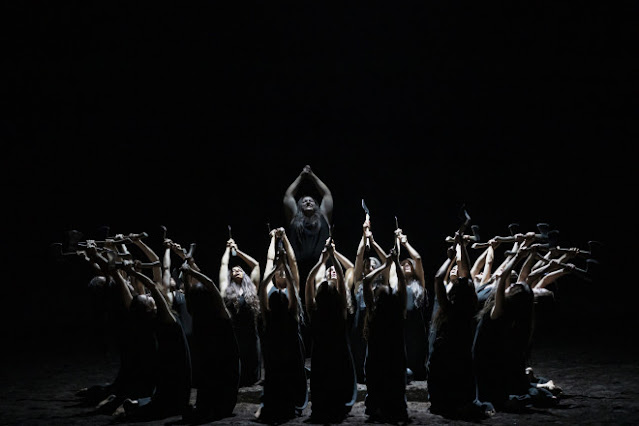Strauss - Elektra
ONP Bastille, Monday May 16 2022.
Conductor: Semyon Bychkof. Production: Robert Carsen. Choreography: Philippe Giraudeau. Sets: Michael Levine. Costumes: Vazul Matusz. Lighting: Robert Carsen, Peter Van Praet. Elektra: Christine Goerke. Chrysothemis: Elza van den Heever.
Klytämnestra: Angela Denoke. Aegisth: Gerhard Siegel. Orest: Tómas Tomasson. Der Pfleger des Orests: Philippe Rouillon. Die Vertraute der Klytämnestra: Stéphanie Loris. Die Schlepptragerin: Marianne Croux. Ein junger Diener: Lucian Krasznec. Ein alter Diener: Christian Tréguier. Die Aufseherin: Madeleine Shaw. Erste Magd: Katharina Magiera. Zweite Magd: Florence Losseau. Dritte Magd: Marie‑Luise Dressen. Vierte Magd: Sonja Šarić. Fünfte Magd: Laura Wilde. Dienerinnen: Sophie Claisse, Rocio Ruiz Cobarro, Caroline Bibas, Yasuko Arita, Daniela Entcheva, Caroline Petit. Orchestra and Chorus of the Opéra National de Paris.
 |
| Photos: Emilie Brouchon/ONP |
Whenever, these days, I hear Strauss played competently by the Paris Opera orchestra, it reminds me how much things have improved since the eighties when, at a performance of Rosenkavalier, a friend from Vienna remarked, more in sorrow than actual annoyance, at the interval, 'It's a pity. They can't play it.' Which was true. On Monday, once they'd warmed up, which took quite a while, they were at their present-day best for Semyon Bychkof. They must like him, as you could hear them clapping and even cheering him in the pit at the end. And his total, seemingly easy mastery of the score was actually visible in his body-language. A symphonic approach, with everything under control - maybe a little too much so: 'contenu' (contained) was one word I saw in a French review, describing his restraint. Maybe that was in part for the singers' sake, but I admit I sat there thinking he could let rip more, gone a bit wilder, even at the risk of overpowering his soloists on stage. At the end, we were impressed but not panting with exhaustion. Some people did stand, which is relatively rare here (and immediately led to a loud and furious altercation à la parisienne between those standing and those no longer able to see the curtain calls from their seats).
That being said, the cast was strong; in some cases stronger than I expected. Of Tómas Tomasson I expected nothing, never having heard him before, but he was quite impressive, with an interesting, darkish, grainy, 'woody' timbre and considerable charisma. Gerhard Siegel was as good here as in Wozzeck a few weeks ago. I'll also put in a word here for Lucian Krasznec, as his brief part must be a devil to sing and he carried it off with youthful brio.
Having seen reviews of the opening night complaining there was nothing left but vibrato, I expected much worse from Angela Denoke and actually found her in pretty good shape, even less 'woozy'-sounding than before, though her lower range was hard to hear and she had to keep her highest notes short. Elza van den Heever, who I'd been looking forward to hearing as Chrysothemis after her Empress in concert at the TCE, was announced sick but game to go on, but there was no sign of that and nobody would have guessed: her voice sounded bright and healthy and she made no attempt - nor did she need to - to duck out of the top notes. What, I wonder, would she have been like if well?
I'd only seen Christine Goerke once before: 16 years ago, as Gutrune in Bob Wilson's production of Götterdämmerung at the Châtelet. 'Rydl and Christine Goerke put in the nearest thing to old-style Wagnerian performances of the evening,' I wrote back then. In recent years, I've seen her come in for a lot of criticism in the US, but wondered why. Here, her performance was monolithic, dramatically and vocally, and I definitely felt a frisson at her opening 'Agamemnon'. Her voice is big and dark. I especially appreciated hearing the lower notes actually sung and sustained: notes not grunts or wheezes. At the top, she may not actually be singing the notes as written; but if not, she's does a very clever job of somehow making it hard to tell for sure, and like any Elektra worth her salt, she got an ovation at the end, standing or not.
Carsen's production, which I previously saw in 2013, is still the best I can remember seeing of this work, and I found myself appreciating even more, this time, its dark simplicity. Back then, I was surprised at its sobriety. On Monday, a bit more hysteria wouldn't have gone amiss.





Comments
Post a Comment